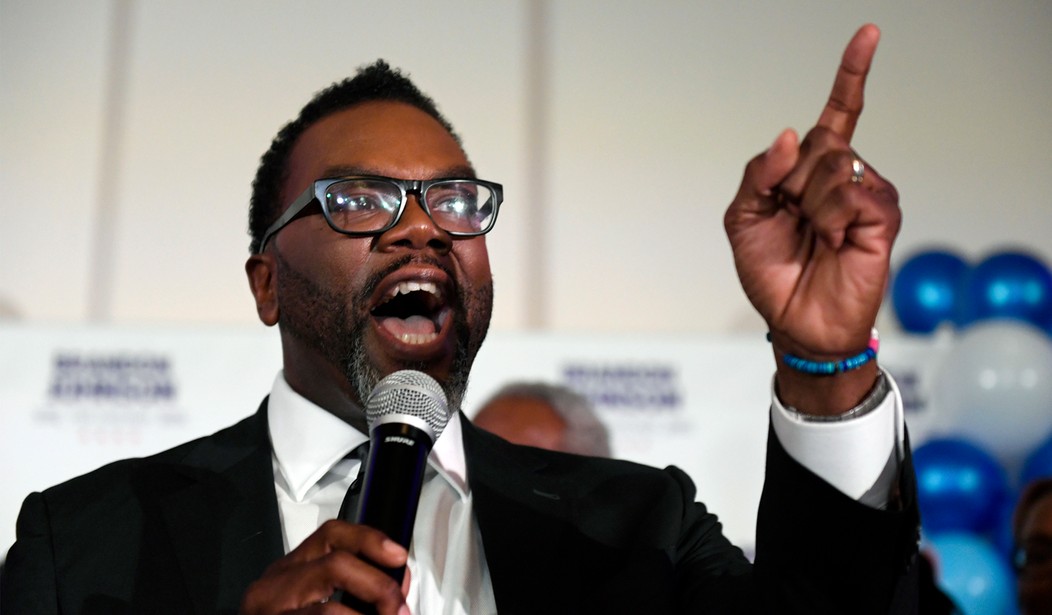How glad is Chicago’s criminal element to see new Mayor Brandon Johnson? The gangs, the thugs, and other criminals have been busy since Mayor Brandon Johnson took office on May 15. Crime has shot up an astonishing 38% — a sign that whatever Johnson is going to do about crime and public safety, he’d better get busy.
Vehicle thefts spiked by 153%, aggravated battery is up 17%, burglary jumped by 12%, and even shootings rose 5%. A few weeks ago, carjackings got so bad the Chicago Police Department had to issue a “community alert urging residents to be more vigilant about their surroundings and to always be on the lookout for suspicious activity when entering or leaving vehicles.”
The lone exception to this pattern is murders, which went down by 5%. In raw numbers, it means there were only three fewer people killed.
Thank the Lord for small favors. Note that shootings still rose 5% while murders are down, indicating that Chicago’s gangs still need some target practice before the summer gets into full swing.
It should be obvious that my tongue is planted firmly in my cheek in pretending to blame Johnson for the increase in crime. Chicago’s crime has risen 56% over the last four years, according to the Examiner’s Jack Elbaum, and Johnson hasn’t been in office long enough to do anything. But that number alone should be a call to rally the police, the citizens, and activists to unite in an effort to retake control of their city from a criminal element that doesn’t care if they live or die in their turf wars and endless vendettas.
Once before, Chicagoans came together to fight gangsters. Prohibition-era gangs had the city in their pocket. Police, aldermen, and even the mayor — Big Bill Thompson — did the bidding of the gangsters. The myth that Eliot Ness came to town and cleaned up the city is hardly accurate, but the methods used to fight and defeat the gangsters aren’t a myth. The city’s elites came together and, along with some courageous prosecutors, eventually got the worst of the gangsters off the streets and sent them to prison.
But before any progress can be made, Johnson has to recognize there’s a problem in the first place.
“We are putting hundreds of millions of dollars now into violence prevention and intervention and disruption,” Johnson said. “We are already seeing the dividends of that.”
Huh?
“We need to be making sure that we are solving violent crimes,” Johnson said. “That will work as a deterrence, so that is important.”
The force of 1,300 detectives in the city probably had to ask Johnson to repeat himself. Johnson, who supported the “defund the police” movement, wanted to disband many of the specialized units that worked to solve violent crime. He changed his tune while running for office and said he never supported defunding the police.
Johnson is a man in serious denial bordering on delusion. He says there needs to be a better “characterization” of Chicago’s young people.
“There has been a lot of mischaracterization of our young people in the city of Chicago,” Johnson said. “Do we have individuals who have lived out their pain in the most violent ways? Of course, but the vast majority of our young people need and want opportunity.”
“Lived out their pain”? What a load of crap. Youth violence is a learned behavior and a product of bad role models for young black teens and men.
Chicago has seen nine teens under the age of 19 die from violence in the past month compared to four during the same timeframe last year. Johnson needs to be educated about the realities facing young black men on the streets, and I can guarantee it has nothing whatsoever to do with “individuals who have lived out their pain in the most violent ways.”










Join the conversation as a VIP Member